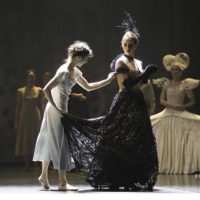For most of these 12 Plays of Xmas, I can imagine how they might be staged, what tone the cast and production team might hope to achieve. But Alkestis… Alkestis is just weird. Euripides’ wrigglesome play was, according to translator Anne Carson, programmed after three tragedies in the Athenian festival of 438BC. ‘It is not a satyr play,’ she says, ‘but neither is it clearly a tragedy or a … [Read more...]
Archives for 2016
12 Plays of Xmas: 4 The Roaring Girl by Middleton & Dekker
It’s pantomime season, which is as good a time as any to pay tribute to the fine British traditions of smutty humour, sexual confusion, homosexual panic and coming over a bit funny when you think about women’s legs. All of the above get a good working over in The Roaring Girl (1611), a Jacobean city comedy in which Thomases Middleton and Dekker fit a real-life gender renegade into a giddy mesh … [Read more...]
12 Plays of Xmas: 3 Ruined by Lynn Nottage
I can’t remember how I missed the Pulitzer-winning Ruined when it played in London in 2010. It was at a favourite theatre (the Almeida) and starred favourite actors (Jenny Jules, Lucian Msamati). Maybe I was busy, or distracted. Maybe I didn’t feel great urgency simply because Lynn Nottage’s 2008 play sounded too much like an adaptation of Mother Courage, taking Brecht’s dogged anti-heroine from … [Read more...]
12 Plays of Xmas: 2 Birth by TW Robertson
What does reality look like on stage? I’ll tell you what it doesn’t usually look like: a play that sets the finale in ivy-covered ruins on an aristocratic estate. Or a plot of exemplary neatness in which two pairs of brothers and sisters each fall in love with their opposite (heterosexual) number and temporarily repair the rents in the Victorian class system. I chose one of TW Robertson’s … [Read more...]
12 Plays of Xmas: 1 Owners by Caryl Churchill
Caryl Churchill is the presiding playwright of our era. At 78, every play she writes is an event – not because of their rarity, or a forelock-tugging spirit of sentimentality, but because each text explains our time to us, shows us the paths we are taking. She ended 2015 with Here We Go, her devastating shard about death and old age; she began 2016 with Escaped Alone, … [Read more...]
Propwatch: the lace in Giselle
It’s only a moment. Giselle, a migrant seamstress made rootless by a changing world, confronts the dauntingly affluent Bathilde. Their encounter ripples with instinctive distrust (unwittingly, each loves the same guy; this is ballet). Bathilde wears sumptuous black, plume-topped and lace-swathed. Giselle is in faded blue (washed out and washed again) – but she won’t simper, won’t sink in … [Read more...]
Great job. You’re fired
Shakespeare’s Globe yesterday released a baffling public statement. It praised Emma Rice, its new artistic director, for the creative, critical and commercial success of her first season, her achievement in attracting new, diverse audiences. And then it sacked her. Rice will lead one more season, and then she goes – taking, the open-air theatre has decreed, her ‘designed sound and light rigging’ … [Read more...]
Propwatch: the whisky glasses in The Red Barn and No Man’s Land
The past is another country: they drink things differently there. After the gin-marinated 1950s of John Osborne’s The Entertainer, this week I hit the whisky: in the 1960s Connecticut of The Red Barn and then with the 1970s Hampstead topers in Pinter’s No Man’s Land. Gin, in Osborne’s play, is predominantly a woman’s tipple: mother’s ruin, and the ruin of Archie’s maudlin wife Phoebe, loosening … [Read more...]
Madhouse/playhouse
When the great Victorian actor Ellen Terry was preparing to play Ophelia, she visited a London asylum to observe young women who might unlock the character. However, the madwomen were, she wrote, useless for research: ‘too theatrical.’ The interplay between playhouse and madhouse is a theme running unobtrusively through much of Bedlam, a fascinating exhibition at the invaluable Wellcome … [Read more...]
We’ll have a real good time
I rarely meet a revival I don’t like. Classic plays are good for thinking: they re-reveal themselves in each new production, and choices in text and staging function as a conversation between a past and present moment – whether sympathetic discussion or knockdown argument. And then comes Rob Ashford’s benighted retread of John Osborne’s The Entertainer, which doesn’t so much converse with the … [Read more...]










